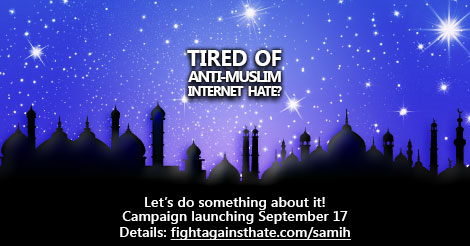Today, on the anniversary of the September 11 attacks on the United States we remember the victims of terrorism. We remember the devastation and human tragedy that extremist ideology can cause. We reflect as today Daesh (ISIS) with its brutal extremist ideology attacks civilians in Iraq and Syria causing an international refugee crisis as large numbers of people flee to save their lives.
Daesh also threatens us at home, it grooms Muslim youth through social media both to join it in the Middle East and to carry out acts of violent extremism at home. The extremism of Daesh has also led to other extremism as the far right, also using the tools of social media, gathers momentum on a wave of hate directed not against extremists, but against ordinary Muslims and their communities. We see both forms of extremism as our FightAgainstHate.com online reporting tool gathers reports from an increasingly concerned public.
“Today as we recall the victims of the 9/11 attack, we also reflect on the backlash and vilification against the Muslim community that occured in its wake. We must stand strong against Daesh’s campaign of terror both locally and globally, but we must equally stand strong against the vilification of a section of our own communities and the vilification of asylum seekers who are themselves fleeing a brutal and extremist regime. Social media provides a platform in which such hate can and is being used to vilify communities and normalise targeted hate in mainstream society. The vilification is spreading rapidly through social media and starting to appear in conversation at work, at home and on public streets. It starts online, but it doesn’t stay there” OHPI’s CEO, Dr Andre Oboler, explained.
In response to these events, OHPI is today pleased to release details of a major new campaign, Spotlight on Anti-Muslim Internet Hate (SAMIH), to be launched on September 17th. The campaign will promote the reporting of anti-Muslim hate on Facebook, YouTube and Twitter to social media platforms and OHPI’s FightAgainstHate.com reporting system. The gathered data on anti-Muslim hate will be analysed and the results publicly shared on International Human Rights Day on December 10th. This initiative will bring together community organisations, government agencies, media and individuals to both gather the data and fund the campaign.
The new campaign:
- Brings together individuals and organisations, worried about the rising anti-Muslim sentiments, by giving them a common purpose: identifying and reporting anti-Muslim hate speech on social media platforms with the aim of getting it removed. It empowers them to act against the rise in hate speech.
- Tracks the response of social media platforms to reports of anti-Muslim hate and brings transparency into their report handling processes.
- The crowd-sourcing of hate items gives us a window into the volume and nature of anti-Muslim hate speech on social media and its visiblity to the public. This will help government agencies and NGOs build effective counter speech messages to nullify the effects of extremism.
- The added monitoring will cause those supporting the far-right to be a little more careful in what they say, reducing the escalation of hate speech into incitement to violence.
We invite all individuals, community organisations, government agencies and media organisations to find out more about joining the campaign. OHPI will launch the campaign, including a crowd-funding appeal to support it, on September 17 at the launch of The Agency at La Trobe University. We thank La Trobe University and their students who have been working with us in creating this important campaign.
NOTES
The Online Hate Prevention Institute (OHPI) is Australia’s National Charity dedicated to tackling the problem of online hate including online extremism, cyber-racism, cyber-bullying, online religious vilification, online misogyny, and other forms of online hate attacking individuals and groups in society. We aim to be a world leader in combating online hate and a critical partner who works with key stakeholders to improve the prevention and mitigation of online hate and the harm it causes. Ultimately, OHPI seeks to facilitate a change in online culture so that hate in all its forms becomes as socially unacceptable online as it is in “real life”.

